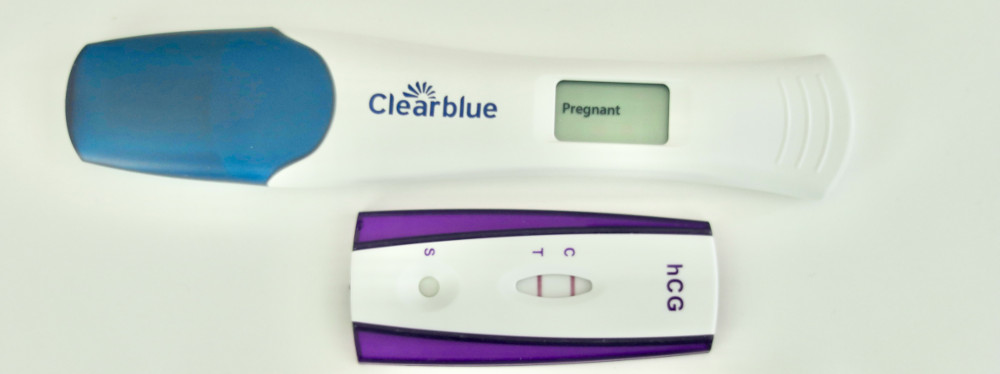It was Mother’s Day, and I was sending a meme to my childfree friend about not being a mom yet. “Wouldn’t it be hilarious if I were actually pregnant right now?” I thought, chuckling at the irony. We had only just started trying, and after years of believing I might be infertile, I wasn’t expecting anything.
Something made me dig through our bathroom cabinet for that pregnancy test I’d bought “just in case.”

Two lines. Clear as day.
I screamed for my husband. He came running, probably thinking I’d hurt myself. Instead, we both stood there staring at a plastic stick in complete silence.
We were going to be parents. Here. In this new country that was still so foreign to us.
Just months earlier, I had been in Mexico, surrounded by family and familiar systems. Now I was pregnant for the first time in Quebec, where I couldn’t even book a doctor’s appointment without stumbling over my words.
The excitement was overwhelming, but beneath the joy was something else: I was about to navigate one of life’s biggest journeys while still figuring out how to simply exist as a newcomer in Quebec.
The System Shock
Getting pregnant as a newcomer in Quebec meant navigating systems I’d never encountered before. The first hurdle? I didn’t even have my health card yet. There’s a waiting period after arriving in Quebec, and I was still in that limbo when I found out I was pregnant.
Once I finally got my card, I discovered Ma Grossesse: a program where a social worker calls to guide you through prenatal care. As overwhelming as everything felt, I was incredibly grateful for this service. Having someone walk me through the system made all the difference for a newcomer and first time mom like me.
The healthcare approach itself wasn’t drastically different from what I knew in Mexico. Both the CLSC here and IMSS back home provide similar prenatal appointments. But there were some interesting differences that caught me off guard.
Want an extra ultrasound or lab test in Mexico? You can walk into any lab and get one, no questions asked. In Quebec, you need a prescription. It’s a small thing, but when you’re anxious about your first pregnancy, these little restrictions feel bigger than they are.

The biggest mindset shift was around private healthcare. In Mexico, if you can afford it, private care is often preferred and some private insurance plans cover it. Here in Quebec, I never felt like I needed it, the public system was very comprehensive. My insurance here only covered services that weren’t already available through RAMQ anyway.
Lost in Translation
I had started some light online French classes about a month after arriving in Quebec, so by the time I needed prenatal care, my French was worse than basic. Surprisingly, this wasn’t usually a problem. Most healthcare providers here are bilingual, and communication with doctors and nurses was always good.
The real challenge? Setting up appointments.
There was one phone call I’ll never forget. I was trying to register with an angry receptionist, using a translation app and asking her to repeat things multiple times. I can’t blame her for being frustrated, it must have been exhausting. The call ended with another person telling me in Spanish that if I wanted to go to the hospital, I had to learn the language.
Thankfully it was over the phone, because the moment I hung up, I started crying so hard. I blamed the hormones, but really, I blame myself for not knowing the language better.
After that rocky start, everything went smoothly. I gave birth in a beautiful room with my husband right by my side. Something that really struck me as different from Mexico. From what friends and family have told me about IMSS, partners aren’t allowed during delivery, and the attention from medical staff can be hit or miss. Plus, with natural births, you’re often discharged just hours after giving birth.
I’m incredibly grateful for the care I received here. Even with the language barriers, the support and attention throughout my pregnancy and delivery were exceptional.
The Maternity Leave Revelation
One of the biggest surprises during my pregnancy was learning about Quebec’s parental leave system. Coming from Mexico, where women get 84 days of maternity leave and fathers get just 5 days, I was blown away by the difference.
In Quebec, mothers get 18 weeks of maternity leave, and fathers get 5 weeks – but that’s just the beginning. There’s an additional 32 weeks of parental leave that can be distributed between both parents however they choose. The flexibility was incredible to discover.
What struck me most was how fathers are actively encouraged to take a bigger role in caring for their newborn. In Mexico, it’s often assumed that the mother will be the default parent, handling most of the childcare responsibilities. Here, the system is designed to support both parents in being present during those crucial early months.
It completely shifted my perspective on what shared parenting could look like. The policy itself sends a message about valuing both parents’ involvement in a child’s life from day one.
Looking Back, Moving Forward
If I could go back and talk to that scared woman crying after a difficult phone call with a receptionist, I’d tell her that it gets easier. That one challenging moment doesn’t define your entire existence.
Yes, there will be language barriers and systems to figure out. Yes, you’ll feel overwhelmed trying to navigate pregnancy in a new country. But you’ll also discover incredible support systems you never knew existed, like Ma Grossesse and even strangers happy to help you through those tough moments. You’ll experience a healthcare approach that values both parents equally. You’ll give birth surrounded by caring professionals who make you feel safe and supported.
Being pregnant as a newcomer in Quebec taught me that adapting doesn’t mean losing who you are – it means adding new layers to your identity. I’m still the Mexican woman who grew up with certain expectations about motherhood, but I’m also now a Quebec mom who understands the value of shared parental leave and comprehensive healthcare.
The journey isn’t always smooth, but it’s worth it.

Your Turn
If you’re a newcomer mom who’s navigated pregnancy in a new country, I’d love to hear your story. What surprised you most about the healthcare system? What challenges did you face, and what support did you find along the way?
And if you’re currently pregnant as a newcomer: you’ve got this. The systems might be different, the language might be challenging, but there’s so much support available once you know where to look.
Share your experiences in the comments below. Let’s build a community where we can learn from each other’s journeys.
